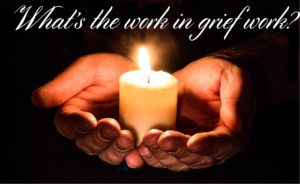
I became an expert on grief and loss, not only due to my graduate studies in social work, but from the multiple experiences of loss in my own life. Nothing like the “school of hard knocks” to clarity what we’re up against in trying to live a satisfying and happy life. You’ve probably heard the term “grief work,” but like me, you never got a real definition of what it entails. The term was coined in 1944 by psychiatrist Erich Lindemann, referring to the actions and tasks that one must complete in order to integrate and resolve grief successfully.
It would help if we knew ahead of time that –
- [bctt tweet=”…the loss of an important significant person, place, or thing, may produce intense emotions that we much honor and learn to express in a healthy manner.” username=”@sheilakcollins”]
Grief is not reserved for the loss of a significant person in our lives. People are often surprised at their reaction to the loss of a pet, a job, or a significant life change like retirement, illness, injury, or disability. It’s important to name these losses in order to be able to appreciate and deal with them. Many people have heard about Kubler-Ross’s emotional reactions; denial, anger, depression, and bargaining, but I’d like to add another not included in that list, exhaustion. Often the challenging experiences that lead up to a loss put us in a state of exhaustion before we begin the work of processing it. And as secondary losses emerge, it takes a lot of energy to recognize and process them.
- [bctt tweet=”…It takes effort, skill and support to let go of the hopes, dreams, and unfulfilled expectations that the loss creates and to accept the new post-loss reality.” username=”@sheilakcollins”]
It would help if our society understood this better so we can get the support we need to do our grief work. A two-day bereavement leave from a job doesn’t cut it, nor is it helpful to be told to “put it behind you” and “get on with your life.”
- [bctt tweet=”…a present loss can bring up unresolved issues seemingly unrelated to it.” username=”@sheilakcollins”]
If our relationship with the deceased person was conflicted, we now must accept it will never be improved as we had hoped. If we experienced an earlier loss, the feelings in the present may be tinged with reminders of that loss. I like to suggest to people that they see this as a two for one opportunity to resolve both losses.
- [bctt tweet=”….building a new life after loss takes the support of others and the courage to transform our goals and expectations of the future.” username=”@Sheilakcollins”]
Rather than putting the loss behind us, we need to bring it with us as a part of who we are becoming. From establishing a scholarship in a deceased loved ones name, to telling grandchildren the stories of ancestors they didn’t get to meet, to dedicating ourselves to honoring loved ones by working to change the world for the better as the parents from Sandy Hook Elementary and the teens at Parkland High School are doing.
And imagine, if all our friends, family, and members of our community knew how important we are to one another, and how to provide the support needed throughout the many episodes of grief we each experience throughout our lives. Since, if we’re lucky, we’re going to be grieving. Let’s learn how to get good at.

